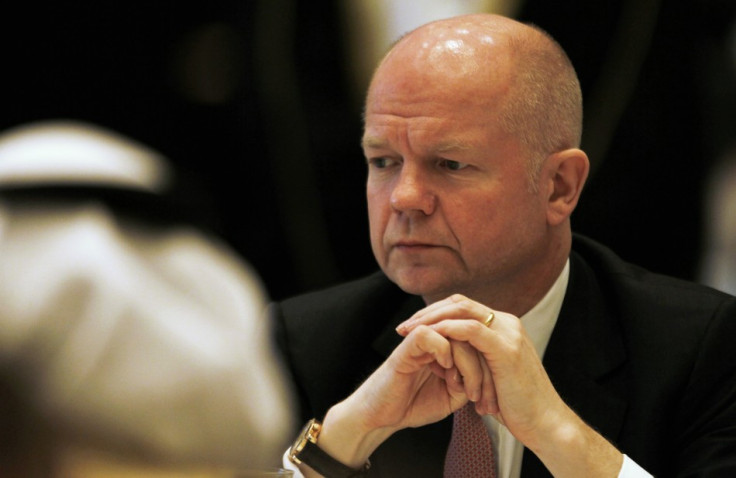Can William Hague Achieve Anything in Syria by Supporting the Rebels?

Great Britain has a long and glorious tradition of arming and bankrolling groups and regimes to fight the good fight on our behalf.
During the 16<sup>th Century Queen Elizabeth I gave much support and assistance to the Low Countries in their long war for freedom against the tyranny and popery of the Spanish crown.
Napoleon Bonaparte cursed "perfidious Albion" for constantly bribing the great states of Europe to wage war on him.
More recently it might be a source of pride for Britons that during the Second World War many a resistance fighter found him or herself armed with a British made Sten Gun and trained by an eccentric gentleman from SOE.
So perhaps we should be pleased that our Foreign Secretary, William Hague, seems determined to continue this tradition by sending armoured vehicles, body armour and other "non-lethal" support to the rebels in Syria.
Sadly I'm not sure that we can be. In the cases mentioned above there was a clear national interest in supporting a weaker power against a sovereign that threatened to eat up all of Europe, be it Philip II, Napoleon or Hitler.
Bashar al-Assad may be many things but he is no Hitler. He and his regime are certainly a danger to parts of the Syrian people (i.e. the parts that don't like him) and to a lesser extent to his immediate neighbours, but he presents no threat at all to the United Kingdom.
There might be a case for supporting the rebels if it were clear that they were all terribly decent chaps who all read the Spectator or even the New Statesman (scraping the barrel as that is according to Ed Miliband) and that they would set up a wonderful new nation like Israel or Turkey.
But what do we find when we gaze upon the rebels? Well one thing we know is that some in the rebel ranks are fanatical Islamists to such an extent, that even George Galloway won't support them, although this might be because Galloway has something of a history with Mr Assad.
That being said it seems pretty clear that were these rebels located in, say, Afghanistan, Yemen or the wilder parts of Pakistan they would be receiving drone strikes rather than aid from Barack "Nobel Peace Prize" Obama and US allies such as ourselves.
And what is "non-lethal" aid anyway? Are armoured vehicles and body armour usually utilised by civilians and refugees? Isn't it the case that this non-lethal kit will be used to better enable the lethal business of firing Kalashnikovs and RPGs? Do these armoured vehicles have machine guns bolted on? If not how long will it be until they do once in rebel hands? Not long I would guess.
Mr Hague might as well send guns without the bullets to the rebels and ask the US to send on the bullets later. After all both shipments by themselves could be regarded as "non lethal".
And to what end? A post-Assad Syria could be anything. It could be a weakened Islamic state like the new Libya, it could become an more sinister satellite of anti-Semitism run by a Hamas-like organisation.
Whatever happens a living hell is almost guaranteed for the country's ethnic and religious minorities. Assad is a tyrant but he's neither racist nor religiously bigoted in his tyranny.
And after all that Syria may just end up with one dictator replacing another and one theocratic regime (Iran) will be a little sadder while another theocratic regime (Saudi Arabia) will be a little happier.
Given all the known and unknown unknowns of the conflict (thank you Donald Rumsfeld) Mr Hague, in supporting the rebels, gives the impression of playing a game of snooker in which his tactic is to try a powershot to scatter all the balls on the table in the hope that, amongst the chaos, it will be the red balls that are pocketed rather than the coloureds.
Sometimes this works, sometimes it doesn't and sometimes one pockets the white in a spectacular own goal. Only time will tell what will result from Hague's gamble on Syria. One hopes it will work but one also fears that it will not.
© Copyright IBTimes 2025. All rights reserved.





















